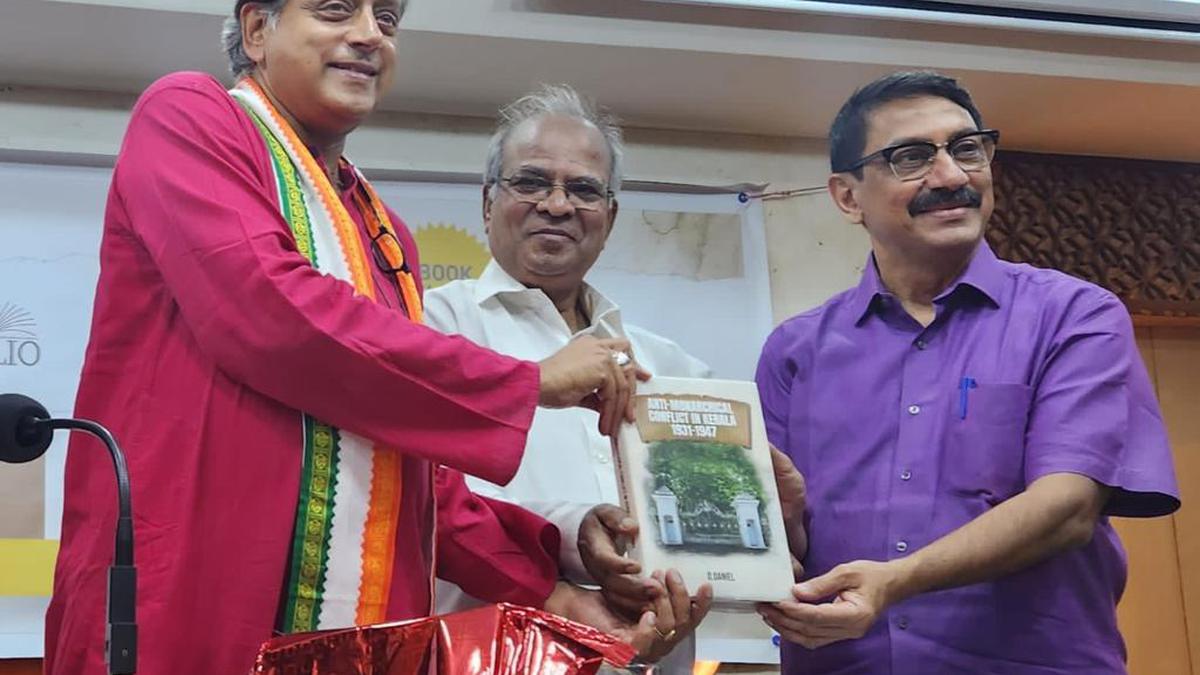
Twilight phase of monarchy in Travancore was a period of both conflict and development: Shashi Tharoor
The Hindu
Twilight phase of monarchy in Travancore was a period of conflict and development: Shashi Tharoor
The sunset years of the erstwhile princely state of Travancore were mired in controversies, including repression of public agitations and uprisings, but it was also a period of commendable industrial and infrastructure development, observed Shashi Tharoor, MP.
Mr. Tharoor was speaking here on Monday after the launch of the book Anti-Monarchical Conflict in Kerala, 1931-1947 written by D. Daniel, former Professor and chairperson, School of Historical Studies, Madurai Kamaraj University.
“Though the twilight phase of Travancore monarchy under the reign of the often-reviled Maharaja of Travancore, Sree Chithira Tirunal, and Dewan Sir C.P. Ramaswamy Aiyar had several repercussions, it also witnessed commendable developments and reforms that resulted in industrialisation and progress of the State,” said Mr. Tharoor after releasing the book by handing over the first copy to Chief Secretary V. Venu.
“The period witnessed cruelty and many of us continue to commemorate the heroes and victims of the agitations and the nationalist movement of the final phase of Travancore monarchy. But I believe that we do need to accept the contributions of Sree Chithira Tirunal, who was a visionary king, and Dewan C.P. Ramaswamy Aiyar, who assisted and implemented all of these initiatives, particularly those that led to the industrialisation and progress of the State,” said Mr. Tharoor.
The king and the dewan had done some extraordinary things which continued to benefit generations of people in Thiruvananthapuram for many years, he noted. Mr. Tharoor also said the author had tried to illustrate the complex interaction of caste, class, and religion during the period in his book.
The work closely traces the twilight years of the princely state in down south since the ascension of the last Maharaja Sree Chithira Tirunal who was in a symbiotic relationship with the then dewan. The period was marked by two striking trends — the growth of nationalism led by Travancore State Congress and that of Communism.
Mr. Venu, however, struck a different note saying: “Good government is no substitute to self-government. To all the wonderful things Sir CP had engineered and the monarch had sanctioned, history tells us that this would never be equivalent to people’s right to govern themselves,” he said.

A massive fire broke out in a palmyrah grove near Chepparai Temple at Rajavallipuram, located about 15 km away from here, on Monday night. As the fire broke out around 9.15 p.m. in the midst of the palmyrah grove, the flames engulfed the dry leaves of the tall trees. Facilitated by heavy winds, the fire spread rapidly in all directions, thwarting the firefighters’ efforts to contain it.

Naam Tamilar Katchi cadre on Monday submitted a petition to the Dindigul Collector urging the authorities to shift a dump yard located in Muruga Bhavan area. The 16.5-acre land could be used for some other public purposes, the NTK functionaries said. They also staged a protest in front of the Collectorate, pressing for the same demand.

 Run 3 Space | Play Space Running Game
Run 3 Space | Play Space Running Game Traffic Jam 3D | Online Racing Game
Traffic Jam 3D | Online Racing Game Duck Hunt | Play Old Classic Game
Duck Hunt | Play Old Classic Game









